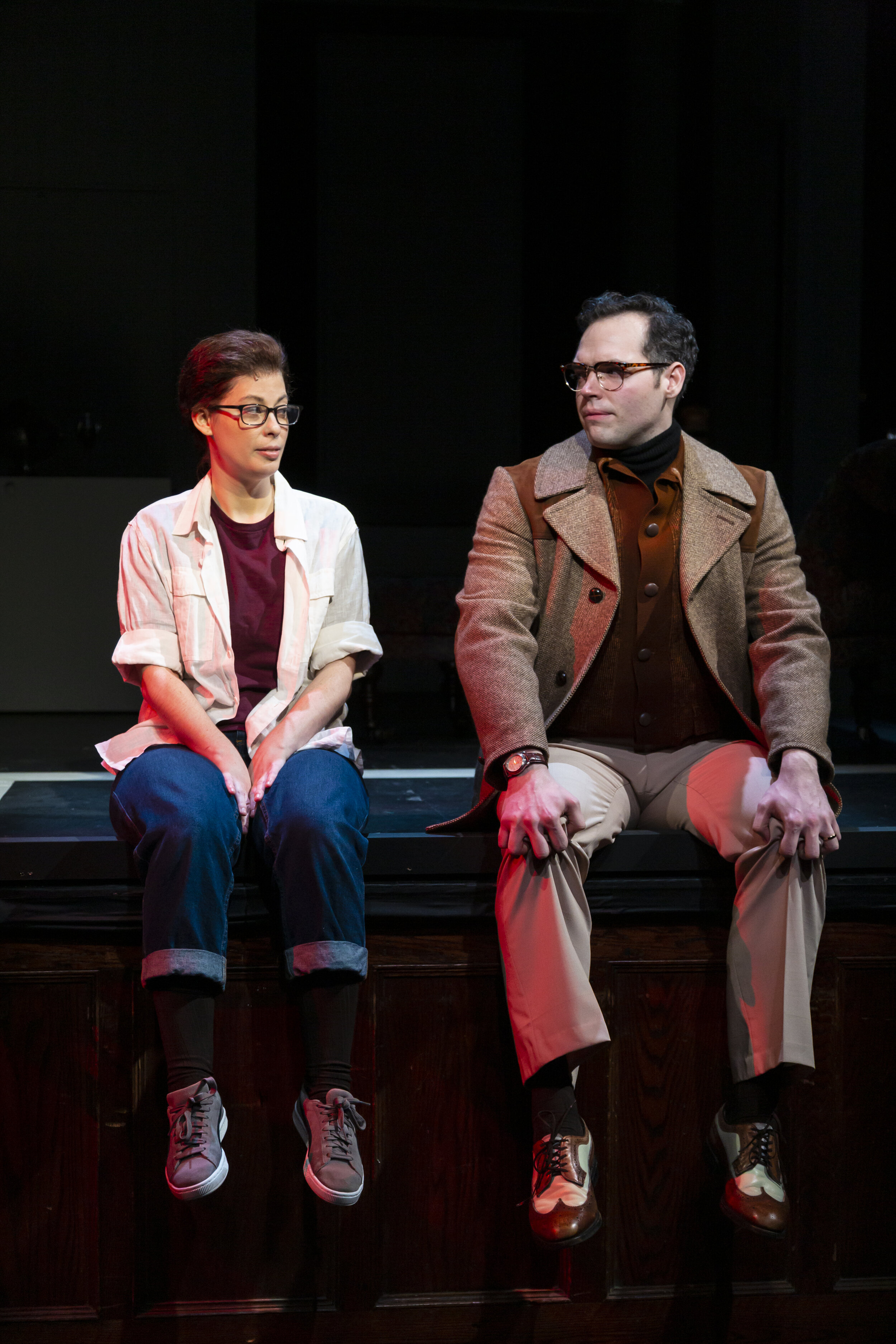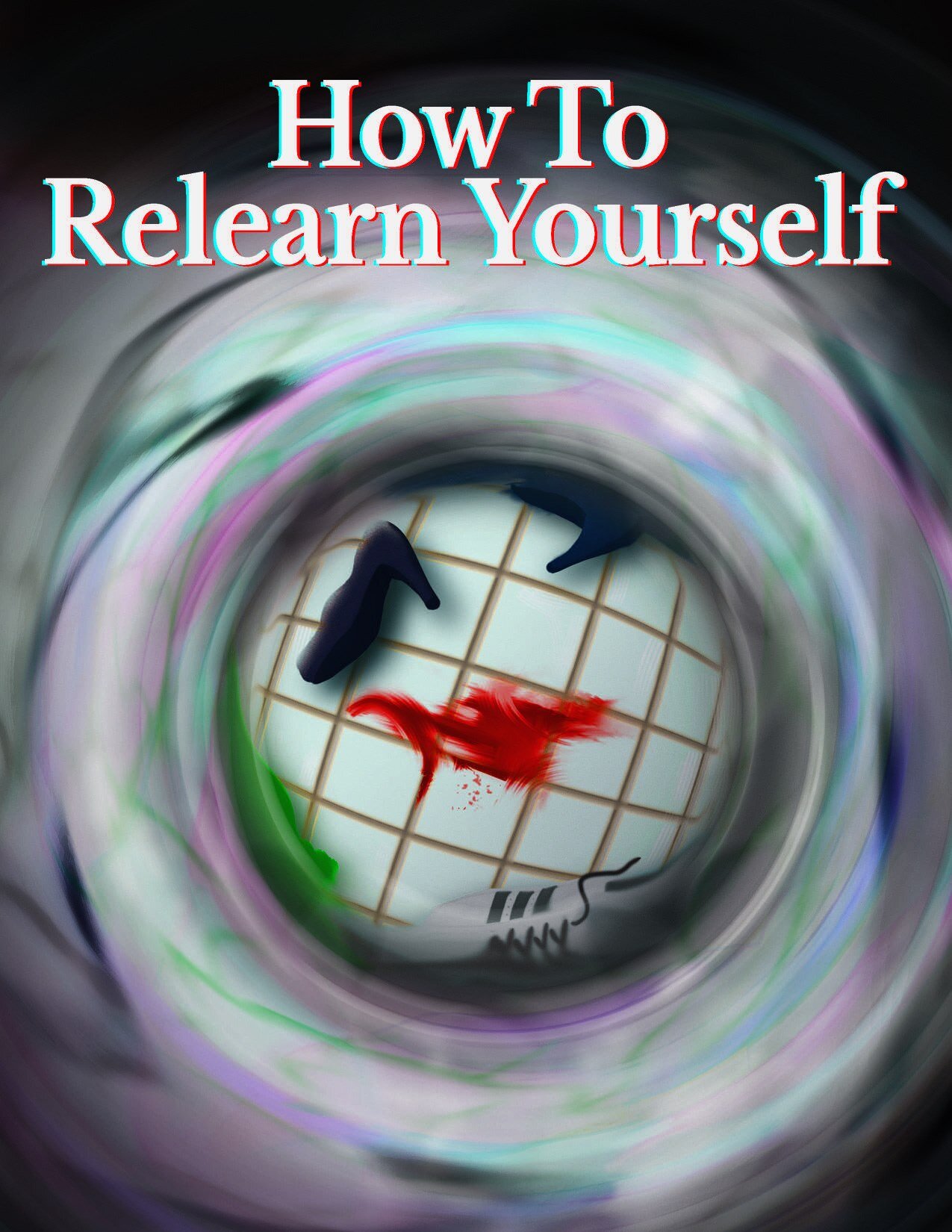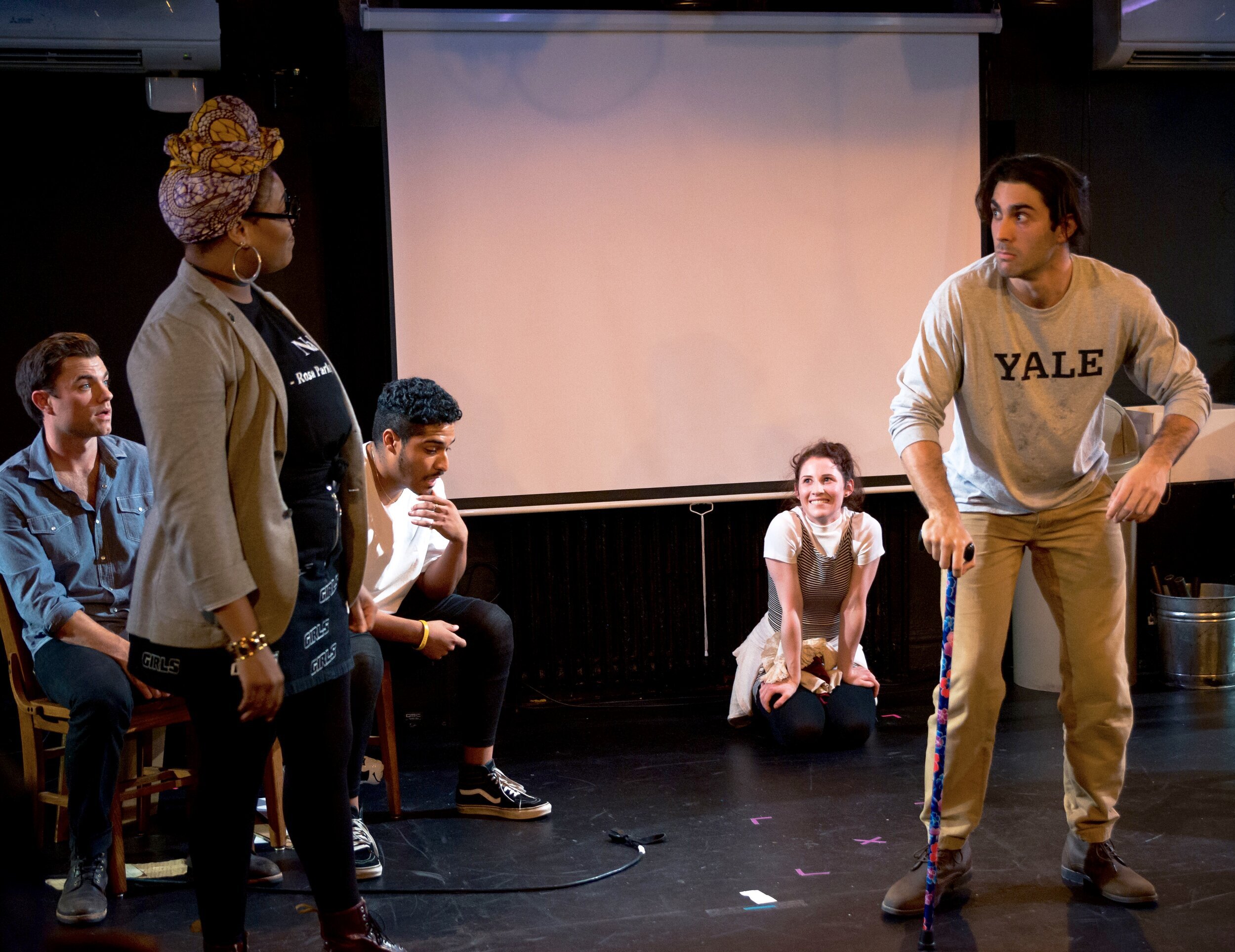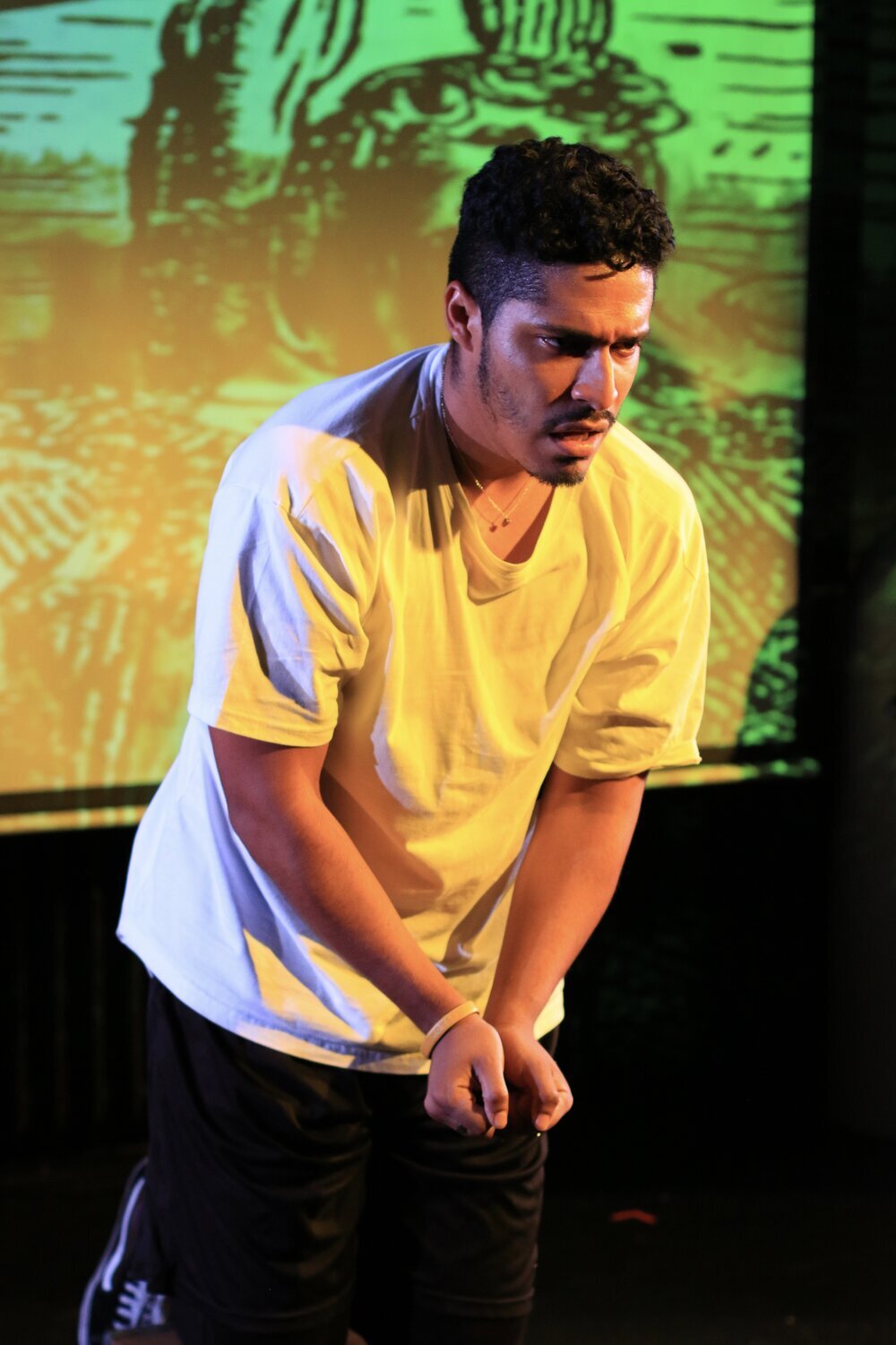Review of Fun Home, Yale School of Drama
The Yale School of Drama production of Fun Home, the Tony-winning musical by Jeanine Tesori and Lisa Kron, based on Alison Bechdel’s graphic novel, is something to behold. A two-story home, with a band in the back on the ground floor and an artist-studio/observation post on the second-floor, graces the stage at the University Theater. The design by Jimmy Stubbs wonderfully foregrounds the notion of “home” that the musical, playing through December 20, interrogates with its story of dysfunction and coping.
The open playing space in front can become the Bechdel family’s museum-like home with its prized antiques, or easily morph into the funeral home that Bruce, the father (JJ McGlone), operates out of the house, or the dorm-room where Middle Alison (Doireann Mac Mahon) discovers the wonders of lesbian love with Joan (Madeline Seidman) or a hotel room where Small Alison anxiously interrogates her dad. A sliding door in a wall gives onto the piano Helen, the mother (Zoe Mann), an actress, practices on and, in one eerie tableau, the space where Bruce works on a naked cadaver (Dario Ladani Sanchez). Key to the appeal of this well-paced production is the way director/choreographer Danilo Gambini makes use of the space, moving the characters through a kind of memory house as Alison (Eli Pauley) tries to come to terms with the enduring influence of her troubled father.
The company of Fun Home with music by Jeanine Tesori, book and lyrics by Lisa Kron, based on the graphic novel by Alison Bechdel, directed by Danilo Gambini. Photo by T. Charles Erickson, Yale School of Drama, 2019
As told, the story of Alison, a comic-book artist, consists of nonlinear scenes, as they seem to occur in Alison’s memory. Always addressing the audience, Alison pitches her appeal to us, making us witnesses to her vexed history. It’s not just the funeral home and her dad’s way of imposing his tastes and his standards (he dismisses comic-book art in favor of serious art). We learn that Bruce pursues young men for sex while remaining the patriarch and, though his wife is aware of his proclivities, that he hides behind a lie of heteronormativity that seems to warp him. And his underage liaisons put the entire family at risk. Then there’s that night in New York when Bruce is willing to leave his kids asleep in a hotel room while he goes out for . . . whatever he goes out for. Alison is upfront about all she doesn’t know about him, and her father’s death—she’s convinced it was suicide—confronts her as a need to weigh both his failings and hers.
The perspective of Alison, as someone who gradually finds the entertainment value of her life, is key to the power of the YSD production. Pauley gives Alison a reflective irony and her presence as onlooker is made manifest by the way Gambini keeps her placed on the periphery of scenes. The effect, aided by visual effects such as Camilla Tassi’s evocative projections of drawings, scribbles and text, and Nicole E. Lang’s varied lighting design, is of a world that is shaping itself into expressive arrangements as Alison gropes to find her own truth.
The songs that make Fun Home a musical have a certain obligatory quality, as if the story of Alison and her family—essentially a tale of estrangement—might be made alright if they can sing about it. The fun songs, like “Come to the Fun Home” and “Raincoat of Love,” show a lively knack for the kinds of family performers—the Jackson Five, the Partridge Family—that Small Alison loves (the latter number features Sanchez as a teenybopper heartthrob and Seidman and Mac Mahon as dead-ringers for Susan Dey in Phuong Nguyen’s costumes). When they appear in tandem, the three Bechdel children—Alison (Taylor Hoffman), Christian (Juliana Aiden Martinez) and John (Laurie Ortega-Murphy)—are fast-moving stick puppets, giving them the infectious charm of the kind of televised entertainment that would appeal to the children. Small Alison, a larger puppet voiced by Hoffman, with puppeteering by Martinez and Ortega-Murphy, maintains an air of melancholy that might be less available to a child actor (puppet design by Anatar Marmol-Gagne).
Middle Alison’s big number of coming out, “Changing My Major,” is thoroughly charming in Doireann Mac Mahon’s rendering—there’s shyness and heat and awkwardness and joy, and Mac Mahon moves about the space as if in a pas de deux with her own sense of wonder. The more emotionally taxing “Days and Days” is a knockout, delivered by Zoe Mann as the one place in the show when Helen comes into her own, finally reaching out to Alison and acknowledging the emotional costs of life with Bruce.
As Bruce, JJ McGlone is perfectly suited to the role. He looks the English teacher—one of Bruce’s occupations—and he plays the doting or disgruntled father well and is able to mood-swing in a way that makes Bruce feel complicated. His striped suit and glances at his reflection while singing “not too bad,” let us know he’s something of a player, but he’s also vulnerable in ways that make him not quite the grown-up Small and Middle Alison assume he is.
Alison (Eli Pauley) and Bruce (JJ McGlone) in Fun Home with music by Jeanine Tesori, book and lyrics by Lisa Kron, based on the graphic novel by Alison Bechdel, directed by Danilo Gambini. Photo by T. Charles Erickson, Yale School of Drama, 2019
The trajectory of Bruce’s character is given two powerful moments late in the play. Gambini places the important car ride between Bruce and Middle Alison (but with Alison taking her place—indeed, the shutting out of Middle Alison behind a sliding wall is very effective) on the edge of the stage. The intimacy that the two almost find is there for us more than for them, and so the scene registers as the tragic lost chance Alison sees it as. Finally, Bruce’s big number, “Edges of the World,” is sung by McGlone from a platform on the second floor, a provisional space from which he tries to survey not only an old house he’s trying to renovate, but also a life that, like the house, may be beyond repair. Like Helen’s “Days and Days,” “Edges” expresses Alison’s sense of her parents’ desperation, which becomes, via song, uplifting and poignant.
Finally, the flying Small Alison—a puppet sustained in midair—is fully buoyed by the merging voices of Hoffman, Pauley and Mac Mahon, affording us a complex moment in which the child contains the elders and the elders share the child’s simple trust in a father who has yet to bully or betray her. Fun Home, in this fully satisfying production, lets the wishful thinking of art’s answer to life hang on that fleeting moment of perfect balance.
Fun Home
Music by Jeanine Tesori
Book and Lyrics by Lisa Kron
Based on the graphic novel by Alison Bechdel
Directed by Danilo Gambini
Music Director: Jill Brunelle; Scenic Designer: Jimmy Stubbs; Costume Designer: Phuong Nguyen; Lighting Designer: Nicole E. Lang; Sound Designer: Noel Nichols; Projection Designer: Camilla Tassi; Puppet Designer: Anatar Marmol-Gagne; Production Dramaturg: Emily Sorensen; Technical Director: Dominick Pinto; Stage Manager: Edmond O’Neal
Musicians: Jill Brunelle, keyboard 1; Liam Bellman-Sharpe, guitar; Margaret E. Douglas, bass; Frances Pollock, keyboard 2; Jim Stavris, drums; Emily Duncan Wilson, reeds
Cast: Taylor Hoffman, Doireann Mac Mahon, Zoe Mann, Juliana Aiden Martinez, JJ McGlone, Laurie Ortega-Murphy, Eli Pauley, Dario Ladani Sanchez, Madeline Seidman
Yale School of Drama
December 14-20, 2019










